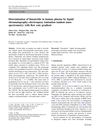 January 2012 in “Elsevier eBooks”
January 2012 in “Elsevier eBooks” New treatments for skin and hair repair show promise, but further improvements are needed.
 20 citations,
May 2011 in “Cancer Biology & Therapy”
20 citations,
May 2011 in “Cancer Biology & Therapy” Finasteride may improve prostate cancer treatment outcomes.
 4 citations,
November 2020 in “Journal of Cosmetic Dermatology”
4 citations,
November 2020 in “Journal of Cosmetic Dermatology” Most Facebook posts about hair loss treatments are promotional and not medically supported, with better quality information found on YouTube.
 December 2023 in “International Journal of Science and Research (IJSR)”
December 2023 in “International Journal of Science and Research (IJSR)” Herbal treatments are effective and preferred for hair loss with fewer side effects.
 July 2012 in “The Journal of Urology”
July 2012 in “The Journal of Urology” Testosterone increases muscle mass regardless of DHT conversion blocking.
 2 citations,
December 2003
2 citations,
December 2003 Saw palmetto is an effective natural treatment for hair loss with minimal side effects.
August 2021 in “Journal of The American Academy of Dermatology” Finasteride treatment changes hormone levels in male pattern baldness patients.
 5 citations,
December 1979 in “Clinical and Experimental Dermatology”
5 citations,
December 1979 in “Clinical and Experimental Dermatology” Anti-androgens are effective for female acne but less so for male-pattern hair loss, with side effects similar to birth control pills.

Male pattern baldness is a common hair loss in men caused by genetics and hormones, with treatments including drugs, hair transplants, and hair loss products.
 8 citations,
March 2020 in “Metabolites”
8 citations,
March 2020 in “Metabolites” Finasteride treatment changes urine metabolomics and steroid signatures, potentially monitoring effectiveness but may cause sexual side effects.
 2 citations,
October 2010 in “European Journal of Drug Metabolism and Pharmacokinetics”
2 citations,
October 2010 in “European Journal of Drug Metabolism and Pharmacokinetics” Researchers developed a quick and sensitive way to measure finasteride in blood using a small sample size.
 7 citations,
January 2022 in “Animal Reproduction”
7 citations,
January 2022 in “Animal Reproduction” Using rodents for research shows that health problems in the womb can cause diseases later in life.

Finasteride reduces prostate size and PSA levels in young patients.
 174 citations,
November 2002 in “Expert Reviews in Molecular Medicine”
174 citations,
November 2002 in “Expert Reviews in Molecular Medicine” Hair loss needs more research for better treatments.
 21 citations,
May 2021 in “Prostate Cancer and Prostatic Diseases”
21 citations,
May 2021 in “Prostate Cancer and Prostatic Diseases” COVID-19 might worsen symptoms and progression of benign prostatic hyperplasia, possibly due to inflammation and metabolic disturbances in the prostate gland. More research is needed to confirm this.
 20 citations,
June 2017 in “Hormone Molecular Biology and Clinical Investigation”
20 citations,
June 2017 in “Hormone Molecular Biology and Clinical Investigation” Long-term use of dutasteride for enlarged prostate may worsen blood sugar, cholesterol, and erectile dysfunction.
 19 citations,
April 2020 in “Dermatologic Therapy”
19 citations,
April 2020 in “Dermatologic Therapy” Dutasteride works better than finasteride for hair loss, with both being safe to use.
 417 citations,
February 2004 in “The Journal of Clinical Endocrinology and Metabolism”
417 citations,
February 2004 in “The Journal of Clinical Endocrinology and Metabolism” Testosterone therapy increases bone density in older men with low testosterone levels.
 9 citations,
December 1981 in “International Journal of Dermatology”
9 citations,
December 1981 in “International Journal of Dermatology” The document concludes that early diagnosis is key for treating common baldness in women, but reassurance is often the best approach as hair thinning can be a normal part of aging.

The document explains how certain drugs block hormones to treat cancers like breast and prostate cancer.
 December 2023 in “Journal of the Endocrine Society”
December 2023 in “Journal of the Endocrine Society” Blocking glucocorticoid receptors improves glucose metabolism in a PCOS mouse model.
184 citations,
January 2000 in “European Urology” Blocking the enzyme that turns testosterone into DHT can safely and effectively treat enlarged prostate.
 5 citations,
January 2005 in “Journal of Enzyme Inhibition and Medicinal Chemistry”
5 citations,
January 2005 in “Journal of Enzyme Inhibition and Medicinal Chemistry” New steroids were effective in blocking male hormone receptors in hamster prostates.
 22 citations,
January 2001 in “Chemical & Pharmaceutical Bulletin”
22 citations,
January 2001 in “Chemical & Pharmaceutical Bulletin” Some new progesterone derivatives are better at blocking testosterone conversion than a common drug.
 January 2024 in “Aesthetic Plastic Surgery”
January 2024 in “Aesthetic Plastic Surgery” Botox can help prevent hair loss by blocking cell death in scalp cells.
23 citations,
July 1979 in “Canadian journal of biochemistry” Spironolactone reduces the number of androgen receptor sites in rat skin by blocking them with its metabolite.
12 citations,
January 2018 in “Pharmacology & pharmacy” Pumpkin seed products may help improve prostate and bladder health by blocking certain enzymes and hormone receptors.
 15 citations,
April 2020 in “Journal of The American Academy of Dermatology”
15 citations,
April 2020 in “Journal of The American Academy of Dermatology” Botulinum toxin injections may help treat hair loss by blocking harmful secretion in hair follicles.
 49 citations,
November 2014 in “Journal of Medicinal Food”
49 citations,
November 2014 in “Journal of Medicinal Food” Red Ginseng Extract may help human hair grow by activating growth pathways and blocking negative effects of certain hormones.
January 2004 in “Elsevier eBooks” Anti-androgen drugs can treat conditions like prostate cancer and male pattern baldness by blocking effects of testosterone and DHT.

























